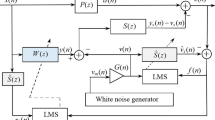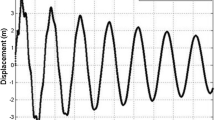Abstract
Filtered-x Least Mean Square (FxLMS) algorithm is a meaningful adaptation algorithm used in the field of Active Vibration Control (AVC). Hybrid FxLMS algorithm, which is the combination of the feedforward structure and the feedback structure of FxLMS, has a better stability and could get the same performance with a lower filter order. In order to get a faster convergence speed, this paper adopts Normalized LMS (NLMS) algorithm to replace of LMS algorithm in the hybrid AVC system. To verify the Hybrid Fx-NLMS algorithm, this paper developed a simulation platform for active vibration control of a flexible beam with piezoelectric stack actuator using ADAMS and MATLAB SIMULINK. Simulation results show that the convergence speed and vibration suppression performance of the Hybrid Fx-NLMS algorithm are better than other traditional algorithms.
X. Zhu—This work is supported by National Natural Science Foundation (NNSF) of China under Grant 51575328, 61503232. Mechatronics Engineering Innovation Group project from Shanghai Education Commission and Shanghai Key Laboratory of Power Station Automation Technology.
Access this chapter
Tax calculation will be finalised at checkout
Purchases are for personal use only
Similar content being viewed by others
References
Morgan, D.R.: History, applications, and subsequent development of the FXLMS algorithm [DSP History]. IEEE Sig. Process. Mag. 30, 172–176 (2013)
Swanson, D.C.: Active noise attenuation using a self-tuning regulator as the adaptive control algorithm. In: INTER-NOISE and NOISE-CON Congress and Conference Proceedings, pp. 467–470. Institute of Noise Control Engineering, Newport Beach (1989)
Kuo, S.M., Morgan, D.R.: Active noise control: a tutorial review. Proc. IEEE 87, 943–973 (1999)
Zhu, X., Gao, Z., Huang, Q.: Active vibration control for piezoelectric flexible structure using multi-channel FxLMS algorithm. J. Vibr. Measur. Diagn. 31, 150–155 (2011)
Barkefors, A., Sternad, M., Brannmark, L.J.: design and analysis of linear quadratic gaussian feedforward controllers for active noise control. IEEE/ACM Trans. Audio Speech Lang. Process. 22, 1777–1791 (2014)
Kar, A., Chanda, A.P., Mohapatra, S.: An improved filtered-x least mean square algorithm for acoustic noise suppression. Smart Innov. Syst. Technol. 27, 25–32 (2014)
Nagumo, J., Noda, A.: A learning Method for system identification. IEEE Trans. Autom. Control 12, 28–287 (1967)
Rupp, M., Sayed, A.H.: Two variants of the FxLMS algorithm. In: IEEE ASSP Workshop on Applications of Signal Processing to Audio and Acoustics, pp. 123–126. IEEE Press, New York (1995)
Elliott, S.J., Stothers, I.M., Nelson, P.A.: A multiple error LMS algorithm and its applications to active control of sound and vibration. IEEE Trans. Acoust. Speech Sig. Process. 35, 1423–1434 (1987)
Popovich, S.S., Melton, D.E., Allie, M.C.: New adaptive multi-channel control systems for sound and vibration. In: INTER-NOISE and NOISE-CON Congress and Conference Proceedings, pp. 19–20. Institute of Noise Control Engineering, Toronto (1992)
Swanson, D.C.: Active noise attenuation using a self-tuning regulator as the adaptive control algorithm. In: INTER-NOISE and NOISE-CON Congress and Conference Proceedings, pp. 467–470. Institute of Noise Control Engineering, Newport Beach (1989)
Bismor, D., Czyz, K., Ogonowski, Z.: Review and comparison of variable step-size LMS algorithms. Int. J. Acoust. Vibr. 21, 2–39 (2016)
Author information
Authors and Affiliations
Corresponding author
Editor information
Editors and Affiliations
Rights and permissions
Copyright information
© 2017 Springer Nature Singapore Pte Ltd.
About this paper
Cite this paper
Fang, Y., Zhu, X., Liu, H., Gao, Z. (2017). Hybrid Fx-NLMS Algorithm for Active Vibration Control of Flexible Beam with Piezoelectric Stack Actuator. In: Fei, M., Ma, S., Li, X., Sun, X., Jia, L., Su, Z. (eds) Advanced Computational Methods in Life System Modeling and Simulation. ICSEE LSMS 2017 2017. Communications in Computer and Information Science, vol 761. Springer, Singapore. https://doi.org/10.1007/978-981-10-6370-1_27
Download citation
DOI: https://doi.org/10.1007/978-981-10-6370-1_27
Published:
Publisher Name: Springer, Singapore
Print ISBN: 978-981-10-6369-5
Online ISBN: 978-981-10-6370-1
eBook Packages: Computer ScienceComputer Science (R0)




